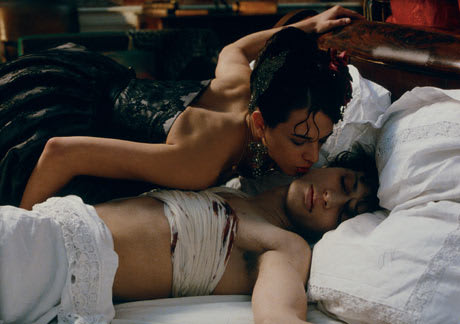Staying true to her singular feminist roots and psychosexual explorations of the inherent imbalances between men and women, but stepping away from prosthetic penises, fun with menstrual blood and brutal parallels of symbolic emotional rape, Catherine Breillat has assembled her most accessible art house film to date.
Its a slightly perverse, subtext-laden and stuffy Masterpiece Theatre-style entry with softcore porn lighting and surprisingly glib insights on female sexuality in relation to religious constructs of male supremacy. Breillats feat here is mainly that of transferring Jules-Amédée Barbey dAurevillys invariably male-centric novel of the same name and spicing it up with some sly feminist critique.
The Last Mistress tells the story of 30-year-old libertine Ryno De Marigny (Fuad Ait Aattou) in 1830s France, where hes set to marry a bleached-blonde and pubis-shaven, chaste aristocrat named Hermangarde (Breillat regular Roxane Mesquida). Being known for his ten-year affair with an Andalusian courtesan called Vellini (Asia Argento), Ryno is eyed warily by those surrounding Hermangarde, which leads him to profess his story to her grandmother, la Marquise de Flers (Claude Sarraute).
The majority of the film is told through this flashback, as Rynos initial dislike for the homely (according to the text) Vellini turns to arousal, pursuance and conquest. Breillats preoccupation with the profane is still apparent in Mistress, with chicken slaughter, wound licking, kooky sexual positions and some erotic asphyxia next to the burning corpse of a three-year-old, but is considerably more palatable in relation to the narrative than much of her previous work. Perversion is often used to symbolise demonised female sexuality, as well as the virulent nature of cannibalistic French socialites throughout the film, and is recognisable as such.
A great deal of the films strength lies in the connection and intensity of the performances from both Aattou and Argento. Their passion is convincing, leading to a greater believability in Rynos struggle to remain faithful to his comely bride, whom he quickly loses interest in.
The implication that men are simplistic creatures driven by sexual impulse and entitlement, while women must use hard-earned wit and manipulation to obtain power, is nothing particularly new or insightful. It is, however, an interesting take on some familiar and somewhat bland material.
(Mongrel Media)Its a slightly perverse, subtext-laden and stuffy Masterpiece Theatre-style entry with softcore porn lighting and surprisingly glib insights on female sexuality in relation to religious constructs of male supremacy. Breillats feat here is mainly that of transferring Jules-Amédée Barbey dAurevillys invariably male-centric novel of the same name and spicing it up with some sly feminist critique.
The Last Mistress tells the story of 30-year-old libertine Ryno De Marigny (Fuad Ait Aattou) in 1830s France, where hes set to marry a bleached-blonde and pubis-shaven, chaste aristocrat named Hermangarde (Breillat regular Roxane Mesquida). Being known for his ten-year affair with an Andalusian courtesan called Vellini (Asia Argento), Ryno is eyed warily by those surrounding Hermangarde, which leads him to profess his story to her grandmother, la Marquise de Flers (Claude Sarraute).
The majority of the film is told through this flashback, as Rynos initial dislike for the homely (according to the text) Vellini turns to arousal, pursuance and conquest. Breillats preoccupation with the profane is still apparent in Mistress, with chicken slaughter, wound licking, kooky sexual positions and some erotic asphyxia next to the burning corpse of a three-year-old, but is considerably more palatable in relation to the narrative than much of her previous work. Perversion is often used to symbolise demonised female sexuality, as well as the virulent nature of cannibalistic French socialites throughout the film, and is recognisable as such.
A great deal of the films strength lies in the connection and intensity of the performances from both Aattou and Argento. Their passion is convincing, leading to a greater believability in Rynos struggle to remain faithful to his comely bride, whom he quickly loses interest in.
The implication that men are simplistic creatures driven by sexual impulse and entitlement, while women must use hard-earned wit and manipulation to obtain power, is nothing particularly new or insightful. It is, however, an interesting take on some familiar and somewhat bland material.
